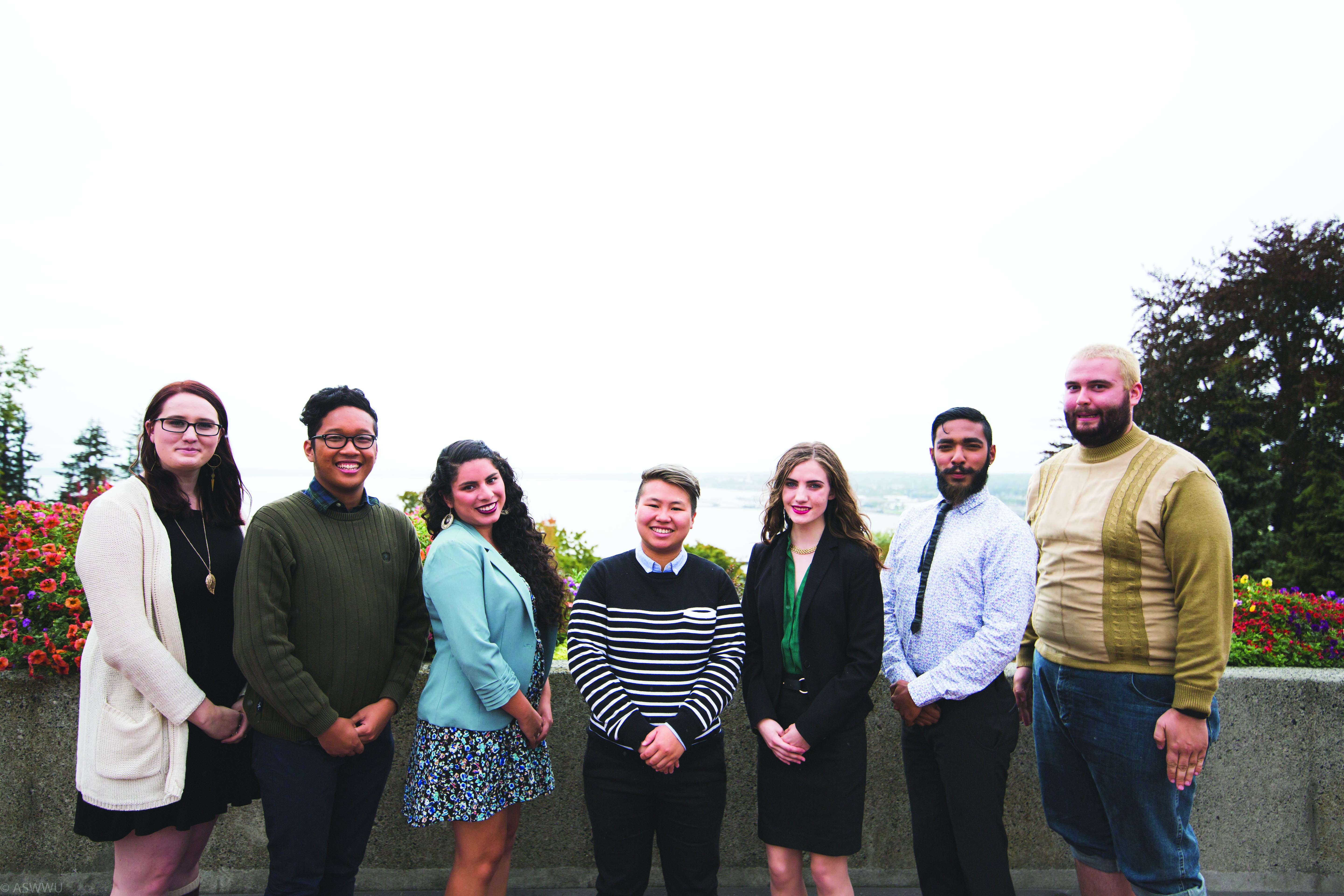By Morgan Annable
Some of them mainline coffee. Some prefer Sour Patch Kids. All of them like making friends. They are just regular Western students. They are the Associated Students Board of Directors.
This year the AS Review will feature a weekly column updating readers on the life and times of the AS Board of Directors. These seven student employees represent and advocate for Western students in a variety of settings. The board office is located in Viking Union 504, behind the post office, and each board member has office hours during which they encourage anyone to visit them to ask questions or just stop by and chat for a minute.
“I love making people coffee in my office,” Stephanie Cheng said. “So come by during my office hours and I’ll make you a cup of coffee.”
Cheng is the AS Board President. She chairs AS board meetings and sits on a number of committees, such as the President’s Cabinet and the Western Foundation Board.
“I serve as liaison between students and admins such as Sabah, the President [of the university],” she said.
Mary Moeller is the Vice President for Business and Operations, or “BusOps” to use the lingo. She works with budgets and grants and all things business-related.
“I oversee, at least partially, the Communications Office, the Personnel Office, the Business Office, and the Assessment Office,” Moeller said. “I act as a liaison to a lot of offices that are internal to the university but external to the AS.”
Often mistaken for BusOps, but quite different, is the VP for Governmental Affairs, a position held by Bryce Hammer, who stated the parameters of her job quite succinctly.
“The VP for Governmental Affairs works with Representation and Engagement Programs, Western Votes, the Washington Student Association, and United States Student Association to ensure that student rights are being advocated for at university, local, state, and federal levels,” she said.
Aleyda Cervantes, VP for Diversity, also advocates for student rights through her work with the Ethnic Student Center (ESC) and Resource and Outreach Programs (ROP).
“We do a lot of programming advocacy work,” she said. “ I also work as liaison between the AS and different groups outside the AS that work with underrepresented students.”
When it comes to working with groups, no one oversees more of them than Alex LaVallee, the VP for Activities.
“I oversee all of the AS’s 200-plus clubs,” he said. “KVIK, KUGS, AS Productions, just to name a few.”
LaVallee also acts as a representative for university athletics.
“Anything related to activities, that’s what I cover,” he said. “And you can quote me on that.”
Wayne Rocque, the VP for Student Life, is a bridge between students, university residences, transportation, dining programs, and health and safety. He also oversees the Environmental and Sustainability Programs, including the Outback Farm, the Sustainable Action Fund (SAF), and alternative transportation.
Regardless of individual students’ club participation, we are all here first and foremost as students. That is where Erick Yanzon comes into play. He is the VP for Academic Affairs.
“I represent the student perspective in the faculty senate,” Yanzon said.
Despite their very different jobs, all of the board members shared the hope that students, both new students and returners, will take opportunities to get involved.
“There’s a million ways,” said Cheng. “Join a club, join a committee, come talk to any of us.”
Rocque agreed, saying that he hopes students will learn about and use the resources available to them.
“There are a lot of resources out here that are underutilized,” he said. “We’re here for you, we’re here to ensure that your academic success is a priority. Also, hold the university accountable for any of the promises that it makes you.”
Hammer pointed out that, while getting involved with activities is an important part of the college experience for many students, no one should feel pressured to do so on a particular timeline.
“Freshman year is overwhelming, and so is a transfer quarter,” she said. “If you don’t have time now, it’s okay. You have time to feel at home here. Nobody’s going to make you do it right away.”
The board members reiterated that they are an approachable resource for students.
“I don’t know why, but sometimes people are intimidated to talk to us,” Cervantes said.
She thinks that students might be intimidated by the lofty-sounding position titles held by the board members.
“But I’m actually a person,” she said. “I go to school here, I procrastinate like everybody. I like talking to people.”

